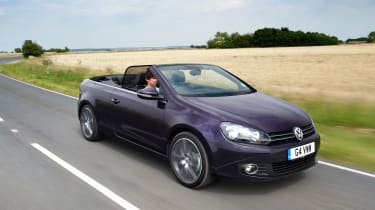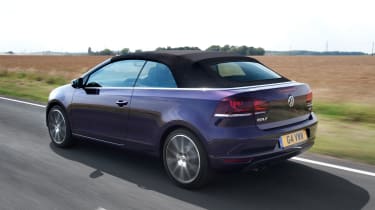Volkswagen Golf Cabriolet convertible (2011-2016) - Engines, drive & performance
What’s really impressive is the VW Golf Cabriolet’s quietness and general refinement, considering it’s a soft-top
With their quiet, free-revving nature and effortless turbo and supercharged performance, VW’s petrol engines are well suited to the Volkswagen Golf Cabriolet – a model that’s more likely to do short trips and weekend pleasure drives than taxing motorway runs. However, the diesels are strong performers and much more economical, if slightly noisier and less refined than the petrols.
Regardless of engine, the VW Golf Cabriolet rides and handles impressively. The steering is light yet accurate and full of feel, while the handling is agile and secure, if not quite as sharp as the hatchback’s. As you’d expect from a convertible, there’s a little bit of body shake, but nothing uncomfortable and certainly not enough to make you doubt the car’s quality.
What’s really impressive, though, is the Golf Cabriolet’s quietness and general refinement. There’s some suspension noise, but little wind noise from the fabric hood. Even at motorway speeds, you can hold a conversation without raising your voice. With the roof down but the side windows up and the wind deflector in place, there’s little buffeting.
Volkswagen Golf Cabriolet petrol engines
The sportiest model in the range - apart from the hot GTI, which we review seperately - is the 148bhp 1.4-litre TSI petrol version. Elsewhere in the petrol engine line-up, the 103bhp 1.2-litre TSI may be impressively frugal, but its 0-62mph time of 11.2 seconds rules it out of anything but gentle top-down driving. The 123bhp 1.4-litre TSI is a better all-round performer – it’s smooth, refined and decently quick, with 0-62mph coming up in 9.9 seconds.
Volkswagen Golf Cabriolet diesel engines
The entry-level 108bhp 2.0-litre diesel does 0-62mph in around 11.7 seconds, while the 148bhp 2.0-litre TDI version does the same sprint in 9.2 seconds.










